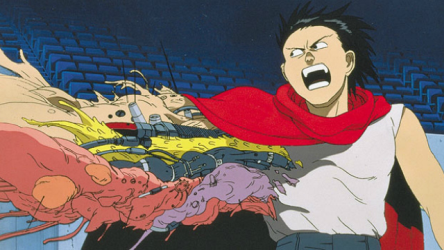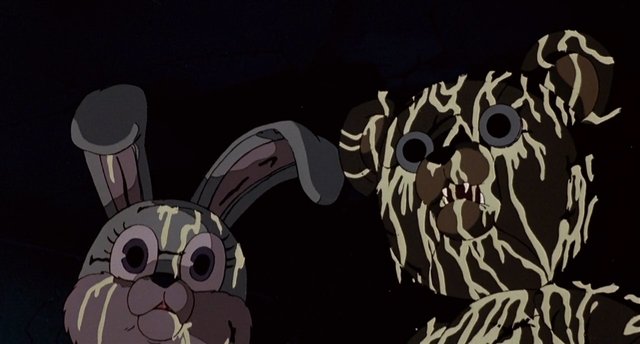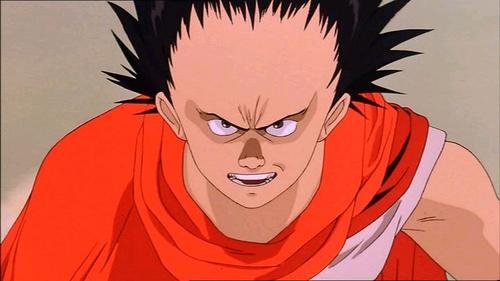My Interpretation: AKIRA (1988)
This is the first in a series of various movies reviews that I'm going to do that aim to shed a new light in the various ways you can interpret a movie, from it's general message to individual ideas found within and so on.
I will attempt to construct my interpretation as unique as possible and therefore I will choose only films that offer more than one possibility to contemplate them, and, what better way to start our list than with the work that popularized the now well-known medium of Anime in the West and that managed to comprise a 2000 page manga into a superbly animated 2 hour film: AKIRA.

Known to older anime fans as being a cult classic, Akira is a thrilling dystopian cyberpunk film guaranteed to remain carved in your mind if for nothing more than its pure shock factor.
But, putting that aside, let's look at the ideas and central message of the film, because it's easy to dismiss the movie as a simple violence fest without taking the proper time to analyze it first.
Due to the huge source material, Akira's story flashes by quite fast, which is worthy of applause, given that we start off with a classic example of a dystopian city, with biker gangs and civil revolts contributing to the general chaos, all accompanied by a beautiful experimental soundtrack that in these scenes mixes heavy breathing sounds to bring out the suffocating atmosphere of a mega city like Neo Tokyo, then the story continues to unveil a corrupt government which experimented on children to enhance their telekinetic powers, we are also shown the revolutionary group that plans to overthrow said government, and it all culminates in a mind-boggling finale.

The ending is crazy!
But all these interwoven plots and flashy scenes carry over a message, something various critics tend to ignore when talking about the film, instead labeling it an empty but impressive spectacle.
The central messages, in my opinion are the following: one is the famous "people shouldn't meddle with things they don't understand" albeit delivered here in a very complex and striking fashion. Just like in Evangelion (where a huge catastrophe, the Second Impact almost destroys humanity) in Akira we see what appears to be a nuclear bomb destroying Tokyo, thus giving birth years later to Neo Tokyo. What we find out later is that the explosion was caused by an individual with immense telekinetic power, the titular character Akira, which is a result of the government's experiments on gifted children. However, despite that tragic event, the scientists in the film continue to mess with that incredible power which will, in the end, result in a similar event.

In one of the scenes the Children try to kill Tetsuo, which shows they have childish minds despite their powers and wisdom, because their "assassins" look like this ^
The other messages are just as poignant: at one point a certain character describes the city as being "saturated" and like "an overripe fruit", but he says that "within the fruit lies a new seed" and that they only have to wait for the wind to make the fruit fall, "the wind called Akira". This leads to the idea that the corrupt government as it is portrayed in the film and its lack of interest towards society is the cause that breeds numerous troubles: the civil revolts we see in the there could be compared to the ones we sadly seem to be experiencing more and more in both Europe and America these days "not my president", and a general sadness of the population which leads to substance abuse, also portrayed in the film and hate between different groups, illustrated here by the biker gangs.
Finally, another big message seems to be about how a chaotic society gives birth to the famous "lone wolves" as they are being dubbed nowadays by the media, individuals angered by the surroundings they grew up and lived in and who decide to make justice for themselves or simply get revenge on the world by committing horrible acts such as terrorism, school shootings and so on. Well, in the movie, a portrait of such a teenager can be seen in the figure of one of the main characters, Tetsuo, one of the members of the biker gang shown at the beginning, but not its leader. The ignorant society around him and the fact that he despises to be weak and have other people save him when he's in trouble, which he says explicitly, "Tetsuo: SHUT UP!!! DON'T ORDER ME AROUND!!!/ Kaneda: We were just worried./ Tetsuo: Why do you always have to try and save me? I could handle it on my own. Yeah, I admit I've gotten beaten before, but I won't always be on the receiving end, you hear that? YOU UNDERSTAND?!?!/ Kaori: Tetsuo, I.../ Tetsuo: [crying] Shut up... go away!" leads to him wreaking havoc on the city and everyone he hated after he obtains his telekinetic powers, reminding us of the "heroine" in Brian De Palma's famous film "Carrie".


They're basically the same.
He could also be compared to the teenagers in the groundbreaking film "If...", one of the first films to show a school shooting decades before it happened in Columbine.

While these films offer a more direct approach on the issue "Akira" presents it to us in a all-encompassing metaphor, found in the brilliant lines of another character that says that humans have great power in them, that they use it to build bridges, houses, rockets, but what if that power was given to an amoeba (a microscopic being)? It wouldn't build anything, it would just " ...devour everything around it". That is a metaphor for Tetsuo who is an angry teenager with the power of a god.
And concerning the mysterious final lines of the movie: "But someday we ought to be able to.../Because it has already begun!" , they concern the fact that, hopefully, the huge power that was at Tetsuo's fingertips could be used to right the wrongs of this world that created the Tetsuo's personality and that the ones saying the line hint at recreating the universe and that such a thing has already begun.
'Til we meet again!